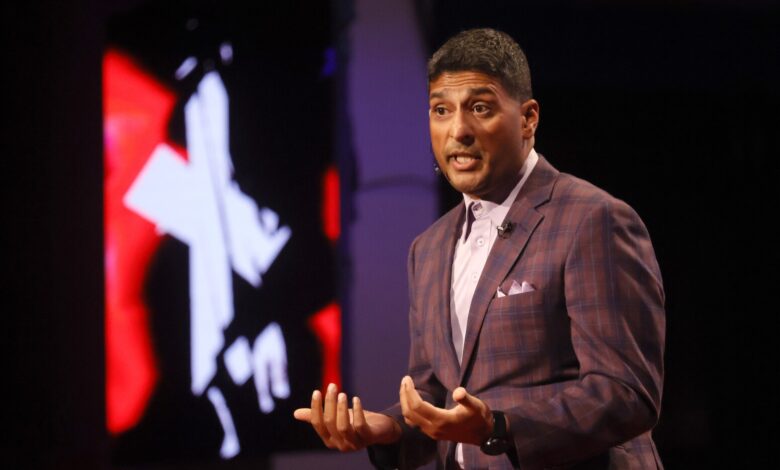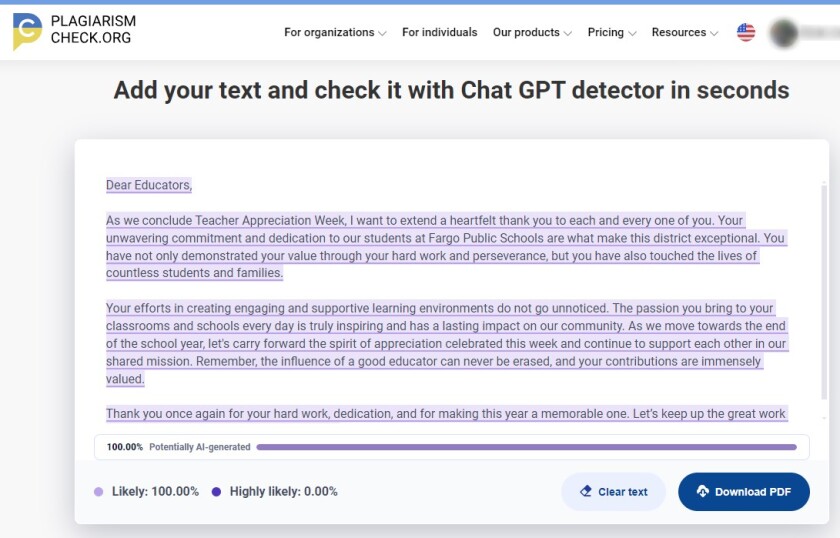Superintendent ’embracing’ artificial intelligence in Fargo schools – InForum

FARGO — A note to teachers from the superintendent of Fargo Public Schools in the waning days of the academic year didn’t go over as he’d hoped.
What Rupak Gandhi wrote as “heartfelt” appreciation to educators for their “unwavering commitment and dedication” instead rang hollow to some, who called out the message as generated by artificial intelligence.
Grant Kraft, president of the Fargo Education Association, said educators contacted him independently after Gandhi’s email went out Friday, May 10, the end of teacher appreciation week.
Contributed
Four separate sources, using AI detection tools, indicated Gandhi’s message was 100% AI generated, Kraft said in a statement to The Forum.
Using
The Forum independently checked Gandhi’s message and found it was 99.91% AI generated.
Gandhi, and others, have said accuracy of those AI detection tools is questionable.
In a recent interview with The Forum, Gandhi said he doesn’t want anyone to think his message was disingenuous.
“That was not the intent and I don’t think that’s the way I intend to use AI,” he said.

Contributed
A prolific user of AI tools, Gandhi said
during his TEDxFargo talk last summer that he used ChatGPT to write his speech,
and that he used AI to write a
superintendent’s column about AI last December.
He also used an AI prompt to start the teacher appreciation message but edited and refined it, with help from district spokesperson AnnMarie Campbell. It probably took “more time and intentionality” to create the message that way, he said.
But concerns go beyond the teacher message, including when AI should or should not be used in education.
Some have questioned whether or not it’s appropriate for the superintendent to use a tool that students in the district aren’t supposed to use.
Gandhi said most who ask that question, and frame AI in a negative way, either haven’t used it or don’t understand it.
“Your natural inclination is that this is a replacement product for something that is authentic. When you understand AI as a tool, you recognize that the product is the sum of everything that you’ve inputted,” he said.
AI technology is receiving increased focus at state and national professional development events, he said.
“It’s going to be a huge part of the future as we move forward, so it’s something that we are embracing,” he said.
Gandhi said he calls on AI virtually every day, using it in writing and to analyze data.
“It’s essentially a way to access information, but connect multiple pieces of information without having to look at them individually,” he said.
He said he’s created custom AI tools to help principals reference district policies instantly, a job that could otherwise take 15 or 20 minutes, and he’s used AI as a math tutor for his son.
“There isn’t an aspect of my life I can think of that I don’t use AI,” Gandhi said.

Alyssa Goelzer/The Forum
AI can help customize different assignments, personalize instruction for students and make content more relevant, he said.
“If this can help with supporting our students, supporting our teachers, why not?” he asked, rhetorically.
Gandhi has said there will be a focus on academic integrity as AI use grows, with Fargo Public Schools creating responsible use policies.
He said academic integrity is based on the standard and skill being developed in students.
If a teacher asks for a student’s original content in a technical writing class and the student uses AI, “that will probably be a concern,” Gandhi said.
But he said he doesn’t believe in creating a “universal rule” about AI because each classroom, teacher and assignment is different.
On a nationwide scale, teachers have mixed views over the role of AI in schools.
A Pew Research Center survey conducted last fall
showed a majority are uncertain about or see downsides to the general use of AI tools in K-12 education.
A quarter of those teachers said using AI tools in K-12 classrooms does more harm than good, one-third reported an equal mix of benefit and harm, while only 6% said it does more good than harm. Another 35% said they weren’t sure, the survey showed.
Tech won’t replace ‘personal connections’
A Fargo Public Schools staff survey conducted earlier this year showed 40% of staff are either slightly, moderately or extremely satisfied with district leadership. Better communication from district administration came up frequently in the survey comments.
In contrast, when asked about school building-level leadership, 78% of the respondents said they either strongly agree, agree or somewhat agree that they feel supported, the survey showed.
In addition, more than half of those surveyed said they disagreed or strongly disagreed that teacher input has and influence when district administrators make major decisions.
Kraft said educators
need to hear from district leadership with personal communication.
“Technology will never replace the personal connections we all need in order to thrive,” he sai in response to Gandhi’s AI-prompted appreciation message.
Kraft said it’s clear that educators also need more guidance from the district on the implementation of AI.

Chris Flynn / The Forum
Gandhi maintains using AI and other tools at their disposal can help with staff burnout and help support teachers.
“We have to model that it is OK to use AI in those ways,” he said.
is the leading educational guidance on artificial intelligence for K-12 schools, Gandhi said, covering everything from policies to the roles of parents and students.
Depriving students of such tools would be more harmful, he said, than teaching them to use the tools and decipher information in the right way.
“I think it’s our responsibility to teach and embrace technology,” he said.



